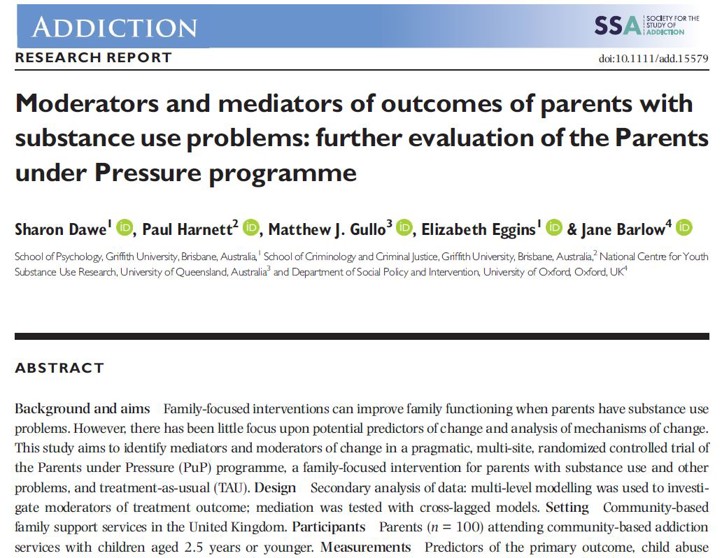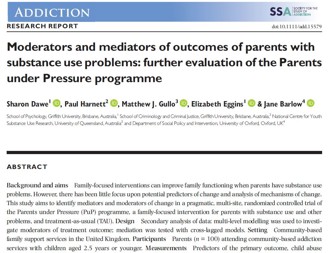ABSTRACT
Background and aims: Family-focused interventions can improve family functioning when parents have substance use problems. However, there has been little focus upon potential predictors of change and analysis of mechanisms of change. This study aims to identify mediators and moderators of change in a pragmatic, multi-site, randomized controlled trial of the Parents under Pressure (PuP) programme, a family-focused intervention for parents with substance use and other problems, and treatment-as-usual (TAU).
Design: Secondary analysis of data: multi-level modelling was used to investigate moderators of treatment outcome; mediation was tested with cross-lagged models.
Setting: Community-based family support services in the United Kingdom.
Participants: Parents (n = 100) attending community-based addiction services with children aged 2.5 years or younger.
Measurements: Predictors of the primary outcome, child abuse potential, were: baseline child age and gender, composite family risk score, parental substance use and parental emotional dysregulation. Mediation was tested across three time-points with the observed variables parental emotion dysregulation and child abuse potential.
Findings Increased child age [Z=2.14, 95%confidence interval (CI) = 0.01, 0.33] at baseline was associated with greater reductions in child abuse potential for PuP programme participants compared with TAU. Poorer parental emotional regulation (Z = 2.48, 95% CI=–2.76, 0.32) was associated with greater reductions in child abuse potential for all participants. Parental substance use (either recent use or primary substance of concern) did not alter any treatment effects on child abuse potential. The mediation analysis showed that PuP produced greater improvements in emotional regulation at post-treatment (P < 0.001) compared with TAU, which predicted lower child abuse potential at 6-month follow up (P < 0.05).
Conclusions: For UK parents enrolled in a family-focused intervention, baseline measurements of higher child age appear to be associated with greater reductions in child abuse potential at 6-month follow-up in PuP participants compared with treatment as usual (TAU). Poorer parental emotional regulation and, potentially, higher family risk, appears to be associated with greater reductions in child abuse potential at 6-month follow-up in PuP and TAU.
Emotional regulation appeared to act as a mediator as improvements in parental emotional regulation post-treatment appeared to be associated with greater reductions in child abuse potential at 6-month follow up. Notably, participation in the PuP programme led to better parental emotional regulation compared with TAU.

